Dissatisfaction with Democracy in Japan: Insights Ahead of the Snap Election
Amid rising dissatisfaction with democracy, Japan prepares for a snap election on October 27, 2024, called by Prime Minister Shigeru Ishiba. A recent Pew Research Center survey indicates a dramatic decline in favorability for the ruling Liberal Democratic Party (LDP), with only 30 percent of citizens expressing support. Additionally, 56 percent report no affiliation with any political party, highlighting a significant detachment from traditional political structures. The overall satisfaction with democracy stands at a low one-third, marking a continued downward trend since 2019.
The political landscape in Japan is currently under significant scrutiny as the nation prepares for a snap election called by Prime Minister Shigeru Ishiba, set for October 27, 2024. This electoral move emerges amidst escalating public dissatisfaction with democracy and the ruling Liberal Democratic Party (LDP), which has maintained a dominant position for nearly 70 years. Recent findings from a Pew Research Center survey, involving 1,003 Japanese adults conducted between January 5 and March 9, 2024, provide a troubling insight into public sentiment regarding governance and political affiliation in Japan. The LDP’s favorability among the populace has decreased markedly, with only 30 percent of respondents expressing a positive view of the party— a significant decline from previous years, marking the lowest approval recorded over seven years of polling. Similarly, the principal opposition party, the Constitutional Democratic Party (CDP), also suffers from widespread disfavor, with merely 29 percent of respondents favorable towards it. Critically, the survey reveals a profound detachment from political parties among Japanese citizens; approximately 56 percent of adults do not feel an affiliation with any political party. This percentage is markedly higher than in most other OECD countries where political party affiliation is typically more pronounced. Despite the LDP’s long-standing governance, only 21 percent of Japanese adults regularly express support for it, greatly overshadowing the meager 4 percent support garnered by its closest rivals, the CDP and the Japan Innovation Party. Furthermore, low voter turnout has been linked to this waning enthusiasm, with Japan often ranking among the lowest in turnout rates, a concerning trend that persists despite automatic voter registration. Of additional concern is the general satisfaction with democracy in Japan, with only one-third of adults expressing contentment with democratic processes. This figure represents a continued decline since 2019, reflecting a growing disenchantment with governance. Interestingly, support for the LDP correlates with satisfaction levels; those favorably inclined towards the ruling party tend to be more satisfied with the democratic system than those who hold unfavorable views, indicating a stark divide in public confidence based on party allegiance.
In recent decades, Japan has experienced a unique political dynamic, characterized by the long-standing predominance of the Liberal Democratic Party (LDP), which has been in power for 65 of the last 69 years since its inception in 1955. This uninterrupted control sets Japan apart from other developed democracies where political power usually oscillates among multiple parties. The LDP’s governance has often been marked by coalition partnerships, notably with the Komeito party since 1999. However, the recent decline in public approval associated with the LDP, exacerbated by scandals, including a significant slush fund incident leading to multiple indictments, has prompted calls for a reevaluation of the party’s tenure and democratic practices. A Pew Research Center survey conducted earlier this year indicates dwindling trust and support among the electorate, challenging the very foundation of Japan’s political stability.
The upcoming snap election presents a critical juncture for Japan as public confidence in democracy falters under the long shadow of the LDP’s prolonged rule. The Pew Research Center data highlights a significant disconnect between the electorate and traditional political affiliations, illustrating a growing disenchantment with both major political parties. As Japan approaches the October 27 election, it remains to be seen how this landscape of dissatisfaction will influence voter turnout and the future of political governance in the country.
Original Source: www.pewresearch.org




Post Comment